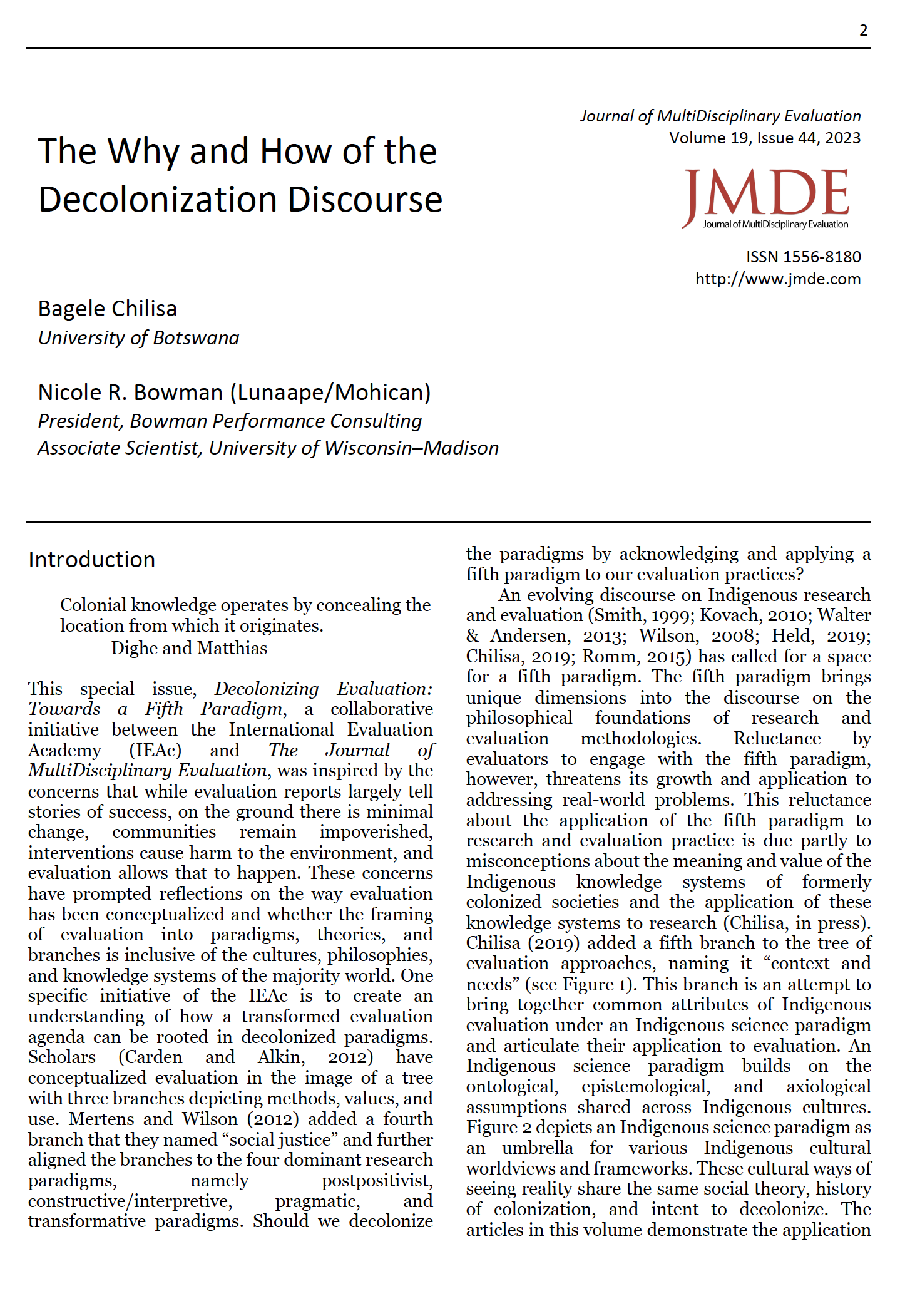Special Issue Editors' Introductory Note: The Why and How of the Decolonization Discourse
Main Article Content
Abstract
The theme of the special issue decolonizing evaluation: towards a fifth paradigm, an initiative of the International Evaluation academy (IEA), was inspired by the concerns that while evaluation reports largely tell stories of success, on the ground there is minimal change, communities remain impoverished, interventions cause harm to the environment and evaluation allow that to happen.
Downloads
Article Details

This work is licensed under a Creative Commons Attribution-NonCommercial 4.0 International License.
Copyright and Permissions
Authors retain full copyright for articles published in JMDE. JMDE publishes under a Creative Commons Attribution-NonCommercial 4.0 International License (CC BY - NC 4.0). Users are allowed to copy, distribute, and transmit the work in any medium or format for noncommercial purposes, provided that the original authors and source are credited accurately and appropriately. Only the original authors may distribute the article for commercial or compensatory purposes. To view a copy of this license, visit creativecommons.org
References
Billman, J., & Chilisa, B. (in press). The power and politics of knowledge production in program evaluation: Funder, methodological, and pedagogical colonialism. In L. A. Wingate, A. Boyce, L. W. Becho, & K. Robertson (Eds.), Core concepts in evaluation: Contemporary commentary on classic writings. Sage.
Bowman, N. R., Dodge Francis, C., Guerrero-Guajardo, A., Taylor-Schiro, E., & King, S. (2023). Seven directions of equitable valuation: Voices, kinship, and visions of Indigenous kwe (women) evaluators. In C. Adeodyin, C. Jones, and N. Onukagha (Eds.), Culturally responsive and equitable evaluation: Visions and voices of emerging scholars (pp. 32–43). Cognella Academic Publishing.
Carden, F., & Alkin, M. (2012). Evaluation roots: An international perspective. Journal of MultiDisciplinary Evaluation, 8(17), 102–118.
Chilisa, B. (2019). Indigenous research methodologies. Sage.
Chilisa, B. (in press). Transformative mixed methods with a postcolonial Indigenous paradigm. In Y. Shan (Ed.), Philosophical foundations of mixed methods research. Routledge.
Corsetti, L. (2022, July 13). Decolonising evaluation practice: Is it time for an increased conversation in Europe? European Evaluation Society. https://europeanevaluation.org/2022/07/13/decolonising-evaluation-practice-is-it-time
Held, M. B. (2019). Decolonizing research paradigms in the context of settler colonialism: An unsettling, mutual, and collaborative effort. International Journal of Qualitative Methods, 18, 1–16.
Kovach, M. (2010). Indigenous methodologies: Characteristics, conversations, and contexts. University of Toronto Press.
Mertens, D. M., & Wilson, A. T. (2012). Program Evaluation Theory and Practice : A Comprehensive Guide. Guilford Publications.
Romm, N. R. A. (2015). Reviewing the transformative paradigm: A critical systemic and relational (Indigenous) lens. Systematic Practice and Action Research, 28, 411–427.
Smith, L. T. (1999). Decolonizing methodologies: Research and Indigenous peoples. Zed Books.
Walter, M., & Andersen, C. (2013). Indigenous statistics. Left Coast Press.
Wilson, S. (2008). Research is ceremony: Indigenous research methods. Fernwood Publishing.

